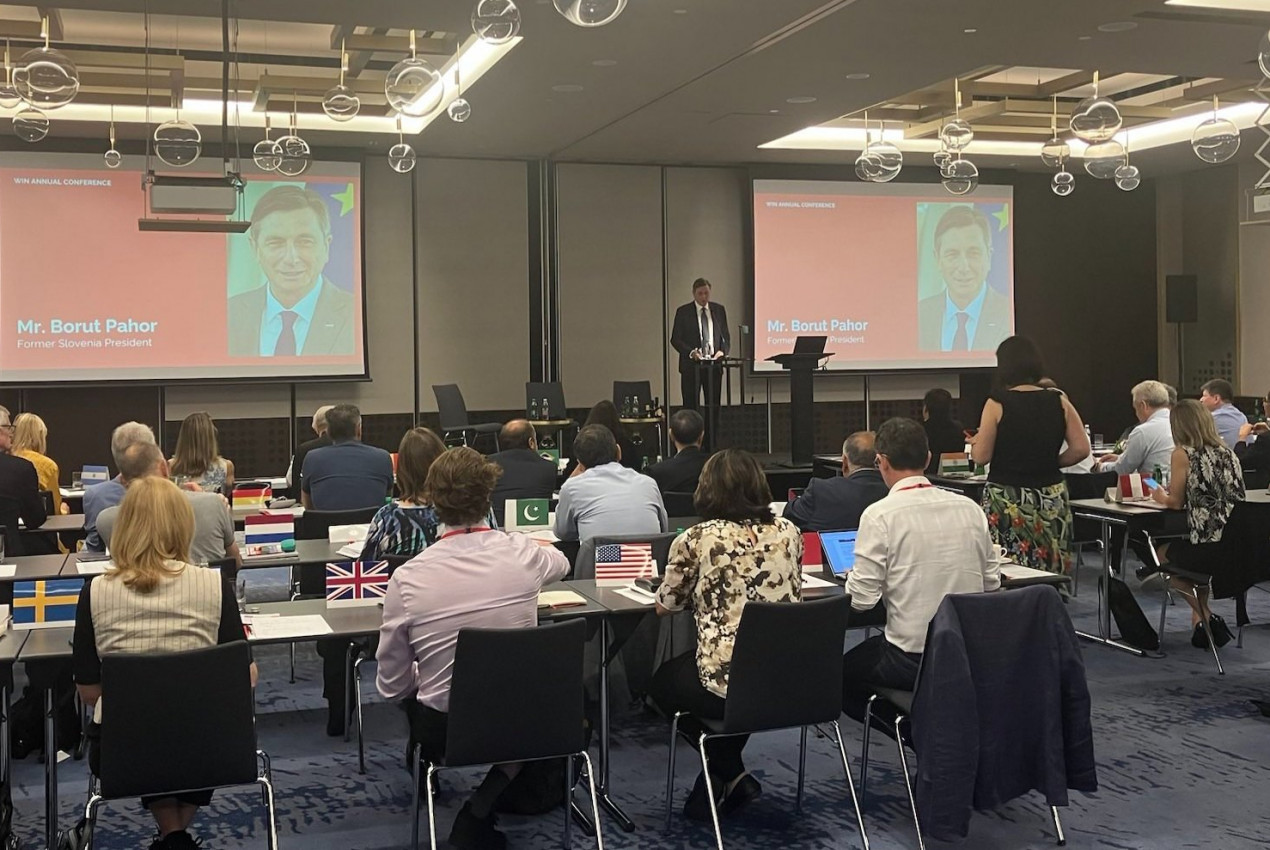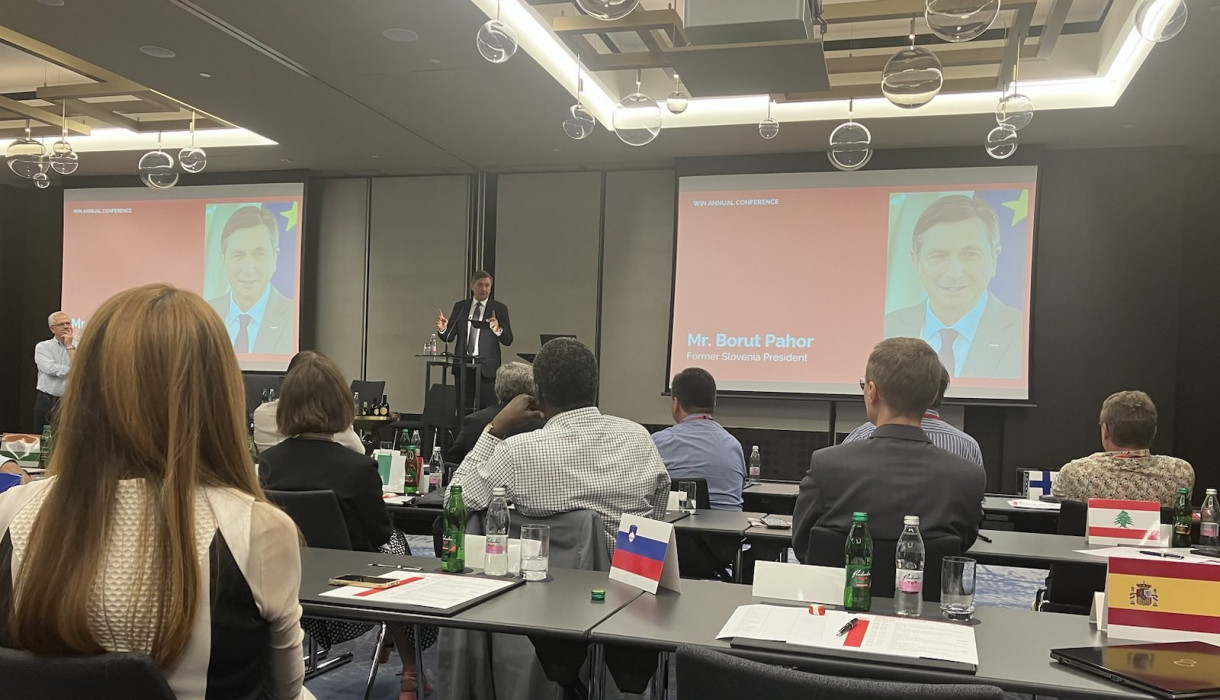
Bivši predsednik republike Borut Pahor osrednji govornik na mednarodni konferenci Worldwide Independent Network of Market Research
Bivši predsednik republike Borut Pahor je kot osrednji govornik nastopil na mednarodni konferenci Worldwide Independent Network of Market Research.
Letošnjo konferenco združenja uveljavljenih neodvisnih raziskovalnih organizacij iz 65 držav je priredil slovenski organizator - Inštitut za raziskovanje trga in medijev Mediana v Ljubljani.
Ljubljana, 12. 6. 2023
Sporočila za javnost , Objave , Govori
Govor bivšega predsednika republike (velja govorjena beseda):
I would like to thank you for the invitation to the conference and the opportunity to address you.
Among you is the respected Ms Janja Božič Marolt, a leading public opinion researcher in Slovenia. Each time she appeared on television to announce the latest results of political popularity polls, I waited quietly to hear what she would say. Well, now finally Ms Božič Marolt is waiting for what I will say today.
As a former politician, I remembered her well. When I ran for the second term of the President of the Republic, all other agencies forecast that I would be elected in the first round, except for Mediana, the agency headed by Ms Božič Marolt. She forecast that I would have to go to the run-off. And so it happened.
Three weeks later, her agency forecast that I would win, but everyone assumed that it was unlikely, since the run-off in presidential elections is usually fateful for two-thirds of the candidates. Mediana and Ms Božič Marolt were right again.
Dear conference,
At the end of last year, as my term of the President of the Republic ended, I concluded a political career that lasted for as many as 32 years. I won various elections nine times in a row and held all political posts in the country. I say this because it seems to me that this cannot be accomplished without a good feeling for and understanding of the public.
It is not true that a politician, and especially a political leader, should always want or need to please the public. It is especially true for political leaders that, in order to achieve their goals and be successful, they must also act against the majority will of the people. This is political leadership. This is essential, but it is also very useful in this case to understand the sentiment and know how to explain it well.
Public opinion polls also help us with this. I followed them throughout my political career. During this time, I also tried to understand surveys correctly. As I already said, not because I wanted to please people all the time, but to see whether my personal assessment of public sentiment corresponds to surveys and why it does or does not.
In doing so, I was probably experiencing all the mixed feelings that a politician usually feels about surveys. As a rule, politicians agree with surveys if they are favourable to them and reject surveys if the results are unfavourable. All of us at this conference can agree that this is very common and very wrong.
Few things in life have surprised me. One of those things is this controversial politician's love of surveys. More than anything, it is essential that the surveys are favourable to them. In this sense, it is not an exaggeration to note Winston Churchill's famous statement that he most strongly believed the surveys that he had rigged himself. When I headed the party, it actually really happened that my aides suggested to me that they could influence a survey that we have commissioned so that it turns out to be favourable. This, of course, does not make sense, but it illustrates some strange magical power that surveys have on politicians.
Of course, I agree with the finding that public opinion surveys measure public opinion to the same extent as they shape it. This is where this controversial love affair between surveys and politicians come from. Most politicians believe or want to believe that the published results, especially if they are good, will favourably affect their popularity. This is partly true, but not true enough to use surveys to run a policy. You cannot run a policy with surveys. Such a mindset is not sustainable.
Personally, I have always looked at surveys with due respect, without underestimating or overestimating their results. Over time, I got used to the fact that surveys are one of my instruments for understanding the public sentiment, perhaps even a very important one, although they are not decisive for my actions. Once I came to grips with this attitude about surveys after many years, it became easier for me to live with them.
Interpreters of surveys and politicians very often make a big mistake when, for example, they try to explain monthly surveys with events from the month in which the survey was conducted. Of course, they try to interpret to the surveys for themselves and the general public. However, this simply cannot be done credibly on a monthly basis. In those thirty years, I have seen many political failures because of this mistake.
My opinion is that important decisions made by politicians, which are detected by the public, manifest themselves after a period of a few months. A decision that one makes in mid-January and that resounds in the public will usually manifest itself only in mid-March. This also applies to corruption scandals, although the reaction time is the shortest in such cases.
In addition, the differences in the monthly measurements are too small to discern any significant change in public opinion, especially when it comes to the rankings of parties or politicians. I want to say that too often they want to over-explain the decimals in surveys.
Trends make surveys particularly persuasive. In this regard, surveys are generally a credible indicator of public opinion. This also applies to comparisons between surveys or the agencies that perform them. If agencies perform the surveys in a professional manner, then their findings are worthy of full attention. Ms Janja Božič Marolt always tries to explain this in different ways, but politicians somehow get enchanted by the results on the screen. As I said, it is a very controversial love, and is perhaps closer to jealousy.
As the speaker of parliament, prime minister or president of the republic, I never in any way asked an agency to measure in any way the sentiment on the essential issues I have dealt with. I never cooperated with a PR agency, either. I didn't even utilise this in either campaign for the president of the republic. But this was not because I distrusted surveys or agencies. I have simply realised that politicians, whether they admit it or not, become slaves to promotion agencies and polling agencies. Basically, in this way, they consequently follow the logic that surveys and agencies create public opinion. As I said, they do, but they mostly measure it. It is this difference where political leadership risks getting lost. Because of this I deliberately resisted this temptation.
Other than that, as I said, I followed surveys and I still follow them. I don’t envy your work. Just like for politicians, elections are also the day of truth for you. Any incompetence or political bias is severely punished. Just look at how long the entire public opinion polling industry, which previously guaranteed that Trump would not be elected, suffered after he was actually elected.
We need each other, but we need to understand our roles. This is a relationship between two autonomous professions that meet in a special way, and they must mutually understand and respect each other. I wish you much success in your work.

Sledila so zanimiva vprašanja.

